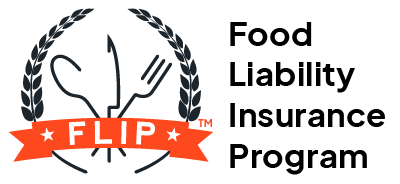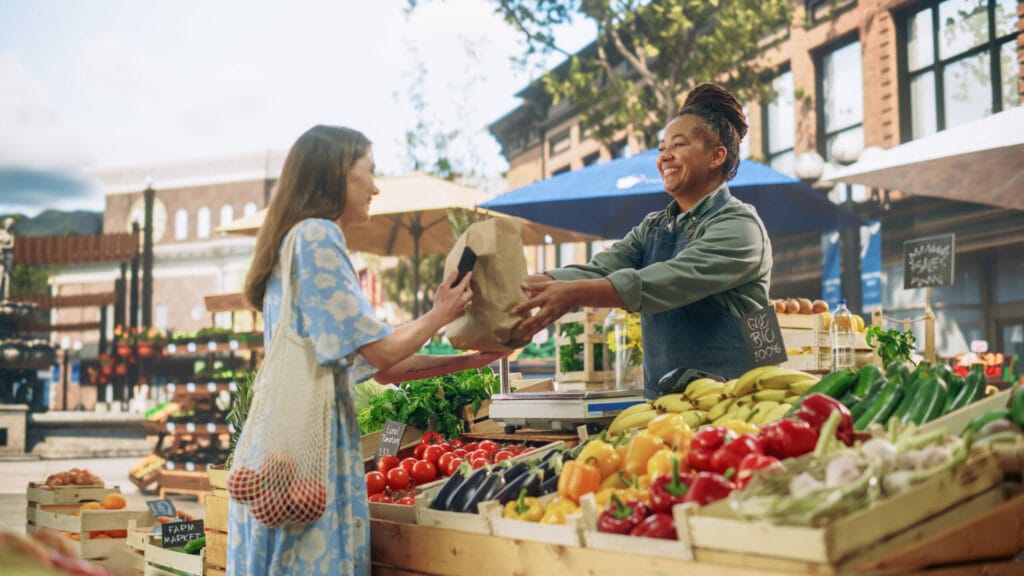Farmers markets can feel idyllic — bountiful booths with fresh produce, locally made treats, and a sense of community you just can’t get at the supermarket.
But farmers markets aren’t without risks, and the liability claims you could face selling at them could cost you thousands of dollars without insurance. Let’s take a closer look at the types of claims farmers market insurance covers and why it’s a critical part of your business.
9 Claims Covered by Farmers Market Insurance
To better understand the risks you’re likely to encounter, we’ll follow two vendors as they navigate liability claims — Maria and Matthew.
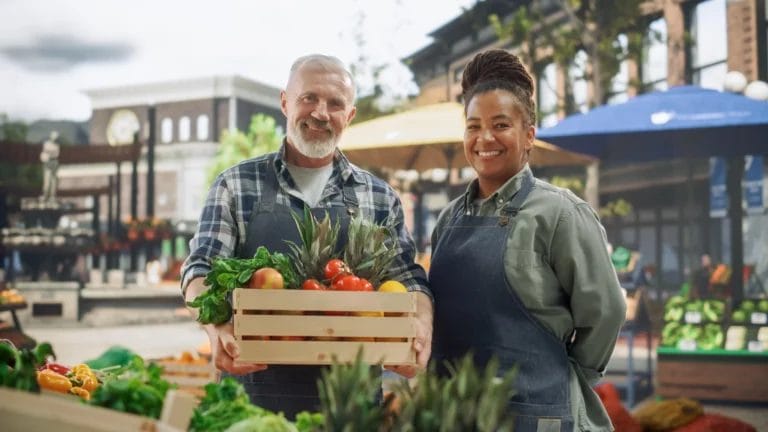
Meet Maria and Matthew
Maria and Matthew are a married couple who operate a stand at their local farmers market where they sell their farm-fresh seasonal produce. They’ve been vending at markets for 15 years, and have been at their current market for the past five years. Their business is insured by FLIP.
Follow along as Maria and Matthew navigate some of the most common farmers market claims — and discover what types of insurance are needed to cover each claim.
But before you dive into the examples below, here’s a quick rundown of the insurance coverages we mention in this blog and what they’re designed to cover:
- Cyber liability insurance: Can cover the costs associated with cyberattacks, such as data breaches, phishing scams, and ransomware
- Damage to premises rented insurance: Designed to cover the cost of repairing damage to a rented premises, including a farmers market booth
- General liability insurance: Built to protect against costs associated with injuries you cause to others during your business operations and damage to someone else’s property
- Personal and advertising injury insurance: Helps cover the cost of legal expenses such as attorney’s fees, settlements, or judgments if your business is sued for false advertising or slander
- Product liability insurance: Can cover the cost of claims stemming from your food products, such as food poisoning or unlabeled allergens
- Tools and equipment insurance (inland marine): Designed to cover the cost of repairing or replacing your broken, damaged, or stolen mobile business gear
- Workers compensation insurance: Helps pay for you and/or your employees’ work-related injury benefits as required by your state
1. Customer Injury
Scenario: While restocking tomatoes on his stand, Matthew leaves a crate on the ground in front of the booth. During a rush, one customer doesn’t notice the crate and trips over it, breaking her wrist on the concrete. She sues Matthew and Maria for negligence, claiming they are to blame for her injury.
Claim Amount: $15,000*
Coverage Needed: General liability insurance
2. Damage to Your Rented Space
Scenario: Every winter, the market Maria and Matthew sell at moves to an indoor facility until the weather clears up in the spring. While setting up their booth for the chilly season, Maria accidentally rams a hand truck filled with plastic fruit crates into one of the venue’s doors, leaving a major dent. The market organizer asks Maria and Matthew to cover the cost of repairing the door, which won’t be cheap because it’s historical and original to the building.
Claim Amount: $5,000
Coverage Needed: Damage to premises rented (part of general liability insurance)
3. Data Breaches
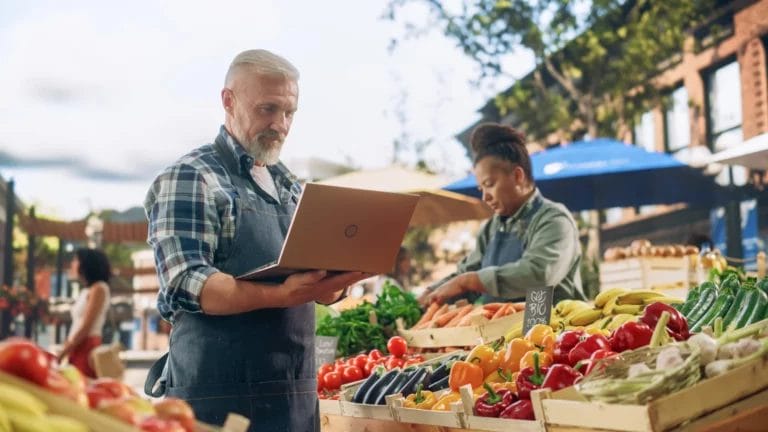
Scenario: Matthew recently set up an online ordering system where local customers can purchase produce crates for pickup at the farm. Sadly, the couple’s website was targeted by a hacker who took advantage of their weak security to steal customer payment information.
Matthew and Maria notify customers of the breach and pay for credit monitoring for anyone affected. They also suffer a hit to their revenue after having to shut down their online ordering system while they determine the source of the breach and pay for heightened cybersecurity.
Claim Amount: $40,000
Coverage Needed: Cyber liability insurance
4. Equipment Theft
Scenario: During the summer months, Maria and Matthew like to sell fresh fruit sorbet alongside their produce. To do this, they use a portable freezer powered by a generator.
Unfortunately, while tearing down after a weekend of selling at the market, a thief steals their generator when Maria and Michael are momentarily distracted. They’re forced to replace the generator as soon as possible or face a hit to their normal summer revenue.
Claim Amount: $1,500
Coverage Needed: Tools and equipment insurance
5. False Advertisement
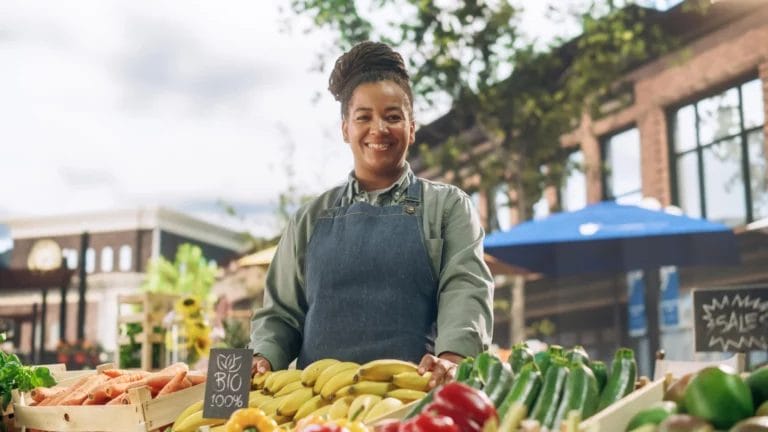
Scenario: Most of the produce Maria and Matthew sell is grown on their family farm, but they also source fruit from a local orchard. The supplier tells them that the apples they sourced are “all natural” and not grown using synthetic pesticides, which Maria takes to mean they’re organic. She writes “Organic Apples” on the chalkboard sign next to them on her booth.
One of the other vendors at the market — a 100% organic produce stall — recognizes the farm Maria and Matthew work with and knows that their fruits are not USDA-certified organic. They sue Maria and Matthew for false advertising, claiming they are misleading customers.
Claim Amount: $25,000
Coverage Needed: Personal and advertising injury
6. Food Spoilage
Scenario: When Maria and Matthew’s generator was stolen over the summer, their freezer wasn’t powered properly. As a result, they lost all of the fruit sorbet they were storing inside it because it was no longer safe to sell to customers.
Claim Amount: $500
Coverage Needed: Tools and equipment insurance
7. Food Poisoning
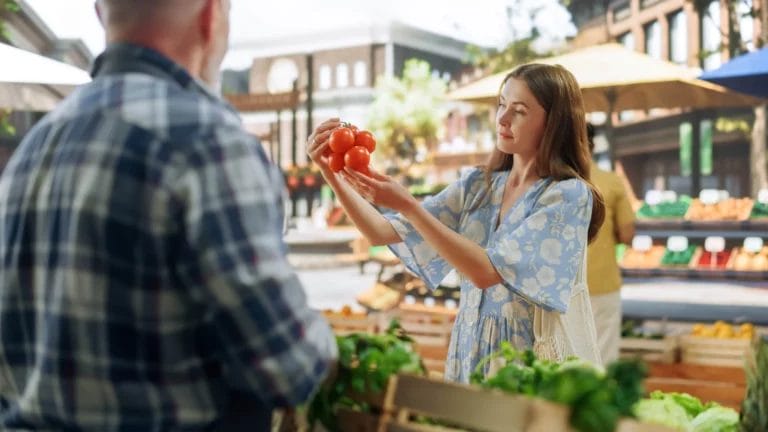
Scenario: One of Matthew and Maria’s customers sues them, claiming the tomatoes they bought from the couple were contaminated with E. coli bacteria. The customer ended up in the hospital for several days and had to miss work after eating the tomatoes, so they’re suing the couple to cover their medical bills and lost wages.
Claim Amount: $75,000
Coverage Needed: Product liability insurance, general liability insurance
8. Owner/Employee Injury
Scenario: While Maria is lifting a heavy crate of spaghetti squash, she pulls a muscle in her back. The injury is so severe, she’s unable to do most of her everyday job-related tasks for the next six weeks. Maria’s personal health insurance policy will not cover this injury because it happened at work.
Claim Amount: $12,000
Coverage Needed: Workers compensation insurance
9. Third-Party Property Damage
Scenario: On a blustery day in spring, a strong gust of wind blows the canopy covering Maria and Matthew’s booth over. The canopy comes to a stop after hitting one of the food trucks parked at the market, but not before its metal legs scrape up the truck’s custom wrap.
Claim Amount: $3,000
Coverage Needed: General liability insurance
*Claim amounts are estimates based on the average costs of similar claims
Why Farmers Market Insurance Is a Must-Have
Okay, so not every vendor is as unlucky as Maria and Matthew — but the truth is, any of the above farmers market claims can happen to you. If they do, you’ll be glad you have insurance.
The majority of the claim examples above cost thousands of dollars because of:
- Medical bills
- Legal costs (attorney’s fees, settlements, judgments, etc.)
- Property repairs/replacements
Most farmers market vendors can’t handle a surprise expense like that and may be forced to temporarily (or permanently) shut down their business to handle the claim on their own.
Compared to the $26 a month paid by 96% of our customers, investing in insurance is well worth it.
With the right coverage, you can have some or even all of the costs of a claim covered, so you aren’t burdened with paying those expenses out of pocket. This allows you to keep selling your goods at the market despite any mishaps, protecting your business and securing its future.
Protect Your Business With Food Liability Insurance Program (FLIP)
FLIP’s base farmers market insurance policy automatically includes several types of coverage every vendor needs, starting at just $25.92/month:
- General liability
- Product liability
- Personal and advertising injury
- Damage to premises rented
Plus, you can add unlimited additional insureds to your policy at no extra cost, so if you sell at multiple markets, you can easily add the event organizer or venue to your coverage.
It’s also easy to increase your coverage with optional add-ons like the ones Maria and Matthew had, including:
- Tools and equipment
- Cyber liability
- Workers compensation
Beyond comprehensive coverage, FLIP makes it easy to manage your policy 100% online, from purchase to filing a claim. You’re busy enough running your business — let us make protecting it as easy as possible. Start your application now and get coverage in 10 minutes or less!
FAQs About Farmers Market Claims
Is Product Liability Insurance Important for Vendors?
Yes! Product liability insurance covers liability claims related to the products you sell, including food poisoning, unlabeled allergens, or foreign contaminants in food. Anyone in the business of selling food needs this coverage to protect themselves from these risks.
Does Farmers Market Insurance Cover Stolen Equipment?
Your farmers market insurance policy can cover stolen equipment if you add tools and equipment coverage to it.
Learn more about tools and equipment insurance and how it protects your gear.
How Can I Protect My Business Gear From Fire or Hail Damage?
Tools and equipment insurance can cover damage to your gear due to fire or hail. This coverage is not automatically included in your farmers market policy, so you must add it during checkout or at any time afterward from your user dashboard.

Alex Hastings
Seattle-based copywriter and (WA) licensed insurance agent Alex Hastings leverages her experience as a lover of fast-casual food, baked goods, and iced oat milk lattes. She holds a B.A. in Creative Writing from Western Washington University. Before working at Veracity, she was a retail copywriter at Zulily and an English language teacher in South Korea. Alex is fully trained on FLIP insurance coverages and writes content that connects food and beverage business owners with the policies they need.
Seattle-based copywriter and (WA) licensed insurance agent Alex Hastings leverages her experience as a lover of fast-casual food, baked goods, and iced oat milk lattes. She holds a B.A. in Creative Writing from Western Washington University. Before working at Veracity, she was a retail copywriter at Zulily and an English language teacher in South Korea. Alex is fully trained on FLIP insurance coverages and writes content that connects food and beverage business owners with the policies they need.
